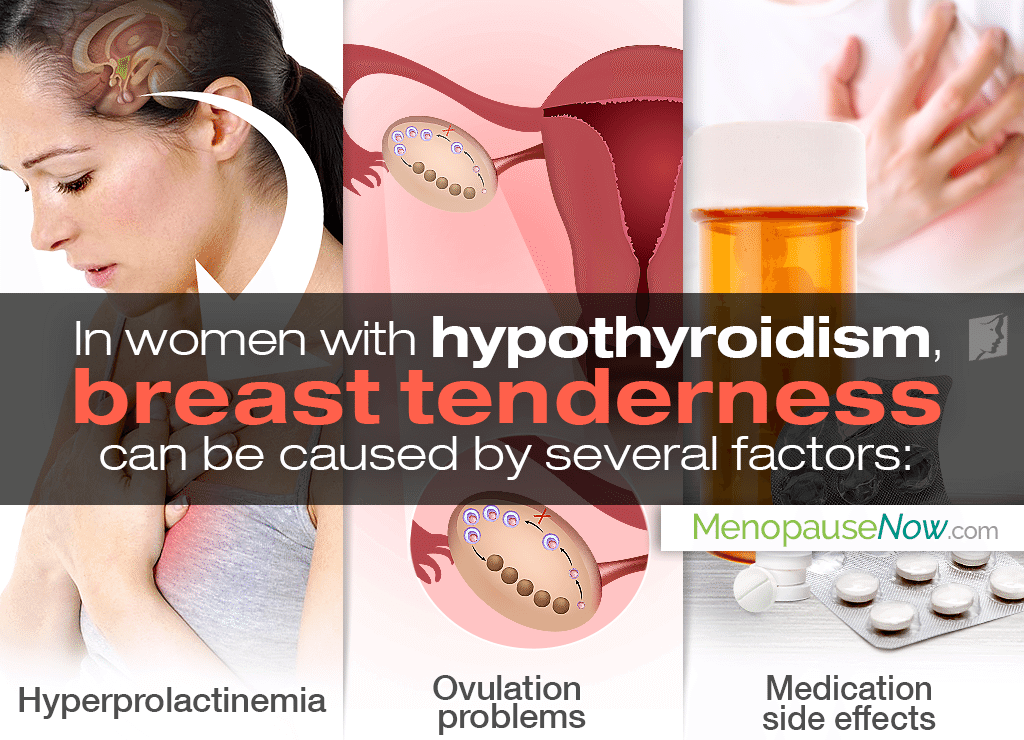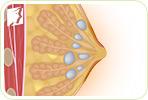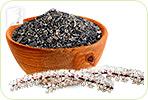Hypothyroidism is a complex endocrine system disorder that can evoke various physical and psychological responses in the body. As such, when a symptom such as breast tenderness arises in women who suffer from hypothyroidism, many may wonder if there is a connection.
Continue reading to learn more about breast tenderness and hypothyroidism, including if breast pain is due to thyroid dysfunction and what can be done for ultimate relief.
Can Breast Pain Be Due To Thyroid?
There are a few factors that could come into play when trying to decide if hypothyroidism is causing breast tenderness and pain.
Firstly, an underactive thyroid, or hypothyroidism, can cause hyperprolactinemia, an endocrine disorder in which there are higher than normal levels of the hormone prolactin in the blood.
Hyperprolactinemia can thus lead to symptoms of breast tenderness or pain as well as vaginal dryness; irregular periods; and galactorrhea, milky nipple discharge when not breastfeeding; among others.
Furthermore, hypothyroidism can provoke reproductive disorders, such as a condition known as ovarian hyperstimulation syndrome (OHSS), putting women at an increased risk of developing ovarian cysts1,2.
Ovarian cysts are usually asymptomatic, but when they do cause symptoms, they include breast tenderness; pain or pressure in the lower abdomen on the side of the cyst; trouble emptying the bladder completely; weight gain; and more.
Lastly, it is reported that thyroid medications can also cause breast pain as they affect estrogen levels, though the link between both thyroid hormones and estrogens needs to be studied further.
It is crucial for women to run appropriate diagnostic tests with their doctors in order to find the real cause behind their breast tenderness, even if they suspect thyroid disease. For example, other conditions can be causing hyperprolactinemia and ovarian cysts aside from a woman's thyroid, such as prolactinoma - a pituitary gland tumor - or polycystic ovary syndrome (PCOS), respectively.
Moreover, if a woman with hypothyroidism happens to experience breast tenderness and is in her mid-40s or early 50s, the symptom might be more related to the menopausal transition than her thyroid disease.
What Can Be Done for Relief?
Several non-invasive breast pain treatments can bring menopausal women respite from their discomforts. However, long-term relief will only be found once the more serious health condition is treated.
Treatment for hyperprolactinemia will be determined based on the cause of the condition. In this case, it deals with handling the thyroid disorder at fault, hypothyroidism.
Likewise, treating ovarian cysts also depends on various factors, such as age and general health. Most women will not need treatment as the cyst often disappears on its own within a matter of weeks or months, yet are told to keep an eye out on their symptoms.
However, the most effective treatment for thyroidism breast tenderness would be to target the mutual underlying cause, hypothyroidism. Depending on its severity, women with hypothyroidism are often prescribed a low dose of thyroid medications for up to eight weeks before being retested. Doses will be adjusted, and the process will be repeated until hormone levels are normal again.
Once the hypothyroidism is under control, symptoms such as breast pain and tenderness should disappear. If not, it is crucial that women keep investigating if they want to find ultimate relief.
Sources
- American Thyroid Association. (2013). Hypothyroidism. Retrieved September 18, 2019, from https://www.thyroid.org/wp-content/uploads/patients/brochures/Hypothyroidism_web_booklet.pdf
- Bahar, A. et al. (2011). Hyperprolactinemia in association with subclinical hypothyroidism. Caspian Journal of Internal Medicine, 2(2), 229-233. Retrieved September 18, 2019, from https://www.ncbi.nlm.nih.gov/pmc/articles/PMC3766941/
- Cedars-Sinai Medical Center. (n.d.). Ovarian Cyst. Retrieved September 18, 2019, from https://www.cedars-sinai.org/health-library/diseases-and-conditions/o/ovarian-cyst.html
- Healthy Women. (2017). 12 Reasons You're Experiencing Breast Pain. Retrieved September 17, 2019, from https://www.healthywomen.org/content/article/12-reasons-youre-experiencing-breast-pain
- Hormone Health Network. (2017). Hyperprolactinemia. Retrieved September 18, 2019, from https://www.hormone.org/diseases-and-conditions/hyperprolactinemia
- MedStar Washington Hospital Center. (n.d.). Hyperprolactinemia and Prolactinoma. Retrieved September 18, 2019, from https://www.medstarwashington.org/our-services/neurosciences/pituitary/conditions/hyperprolactinemia-prolactinoma/
- Siegler, J.E. et al. (2012). Early-onset breast disease: case of a Grave condition with a favorable prognosis. International Journal of Clinical and Experimental Medicine, 5(3), 267-270. Retrieved September 18, 2019, from https://www.ncbi.nlm.nih.gov/pmc/articles/PMC3403549/
Footnotes
- Dharmshaktu, P. et al. (2013). Vanishing large ovarian cyst with thyroxine therapy. Endocrinology, Diabetes & Metabolism Case Reports, 2013, 130050. doi: 10.1530/EDM-13-0050
- John Hopkins Medicine. (n.d.). Thyroid Disorders in Women. Retrieved September 18, 2019, from https://www.hopkinsmedicine.org/health/conditions-and-diseases/thyroid-disorders-in-women




